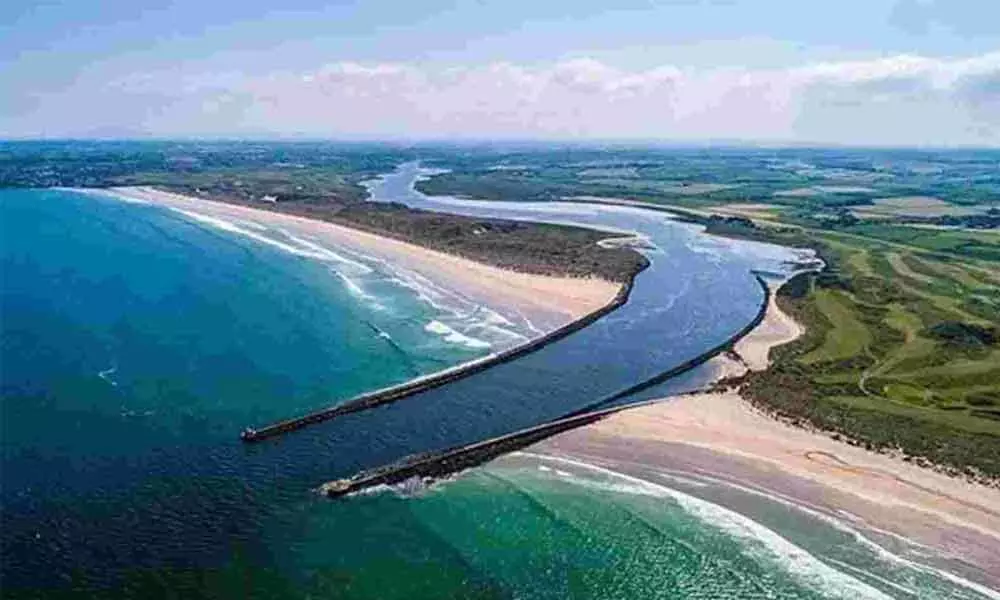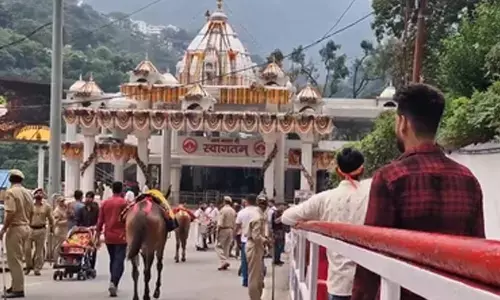River flow into sea is not a waste

River flow into sea is not a waste
The way the two governments of Telugu-speaking States in the recently held Krishna River Board presented their cases and the arguments made outside in newspapers and TV debates by the supporters of respective viewpoints unfortunately suffer from the absence of ‘ecological view’.
The way the two governments of Telugu-speaking States in the recently held Krishna River Board presented their cases and the arguments made outside in newspapers and TV debates by the supporters of respective viewpoints unfortunately suffer from the absence of 'ecological view'.
All the experts on the water resources believe that lot of misuse has happened regarding the river waters because of ill planning and forgetting the ecosystem needs in the construction of dams. The rivers which once carried massive waters into the sea are now almost struggling to complete their natural course of flow and ending up in the sea.
The most important question the environmentalists engaged in the study of the rivers faced is, "how long the rivers will survive if the exploitation of rivers continues unabated and what will happen to the ecosystems associated with those rivers?
The massive impact threatening the productive coastal ecosystems is documented elsewhere and that should be a lesson to the states which are served by Krishna and Godavari Rivers. There is a feeling that being the upper riparian state they are safe from the negative impacts of the "death of the river" as they feel ecosystem damage is at the river confluence area and hit the delta only.
The gangrene damage to a part of the body when left untreated will spread to the entire body leading to the death says the medical science and the same applies to the ecosystem. If the fag end of the river dies because of the restricted flow of rivers downstream through the competitive construction of the dams to impound water the time may not be far away for the negative impact of the 'dead river' reach the upper riparian States.
Both the States are bent on using the river water till the last drop and the officials and irrigation experts of the respective states are apparently seeing the Krishna river water reaching the Bay of Bengal as a "wastage".
One state accused the other as 'irresponsible' in releasing the water through power generation while the other retorted by labelling the other 'inefficient in water management'. This high decibel, motivated arguments are made without consideration to the serious issue of river ecology with which the world is grappling.
The major river institutes are worried about the dying rivers as they fear the increasing threats to the rivers from the impact of climate change, population growth and pollution. As population grows and the politicians make false promises on water access to the gullible voters ignoring the reducing flow of waters in the rivers due to the anthropogenic activities.
Without concern to the health of the rivers because of the reduced water flow in the rivers and threats being posed for the preservation of the integrity of the aquatic ecosystems new projects on the rivers are taken up by the States. The researchers, across the world, foresee the dying up of the rivers in near future unless there is a change in the mindset of people and their leaders on the river water utilisation.
River water flowing into the Sea is not a waste but is an important ecological phenomena happening to protect the coastal ecosystem and this should be noted by all the leaders especially the lower riparian state Andhra Pradesh. Rivers have to carry freshwater into the sea for the health of the coast.
The absence of such fresh water flow is known to effect the coastal ecosystems especially the highly productive mangrove and mud flats. Report from the west coast where the river Narmada is not reaching the ocean for many months of the year records the moving in of the sea into the land leading to the increased salinity, soil degradation.
The saltwater intrusion into the ground is reportedly on the move hitting the industries in that area. Such intrusion has already reported in the Krishna district almost up to 20 Kms . This is because the river water which pushes the sea water out through its natural flow is not happening because of impounding water in reservoirs in the upstream.
Krishna and Godavari deltas are very close to each other and together they support almost 10 million people in area of 12,700 sq. Kms. This is predominantly agricultural area producing paddy and currently shrimp culture is happening, in high intensity, contributing to salinity raise in the ground. The increase in salinity is likely hit the paddy production and these fields since not suited for any other crops will turn barren.
The estuarine ecosystem which includes the mangrove forests is highly productive harbouring the fish, shrimp, prawn etc. needs the continuous touch of freshwater to get the brackish water situation for their growth.
The river flow keeps the salinity level and the brackish water becomes the ideal for the healthy growth of mangroves. Impounding of water at Farakka has affected drastically the growth of Sunderbans in Bengal. The environmentalists of Odisha are worried about the future of the Bhitrakanika wetland as the river Brahmani waters are being drawn for the industrial purpose leaving little chance for the brackish water environ needed for the mangroves.
The estuaries, both Krishna and Godavari, are home for diverse animal life. Krishna wild life sanctuary and Koringa wild life sanctuary are protected under Law. There are estuarine crocodiles, smooth coated otters, serpent eagles, fishing cats, jackals and over 100 bird species.
The reduction in freshwater river flow and consequent increase in salinity is bound to stress the habitats of the fauna and may result in the man-crocodile conflict if the estuarine crocodiles start moving up the river where the brackish water situation is pushed to.
More saline ground water means less production in agriculture and more serious the consequences for the people on either side of the river and the delta proper.So we need to understand the need for the natural out flow of the river into the sea and never say that water is going as waste down the Prakasam barrage.















